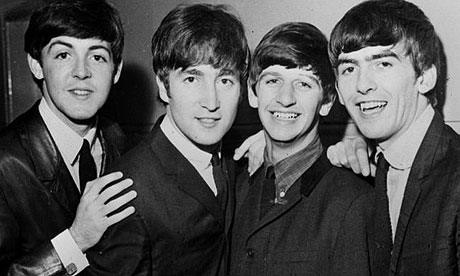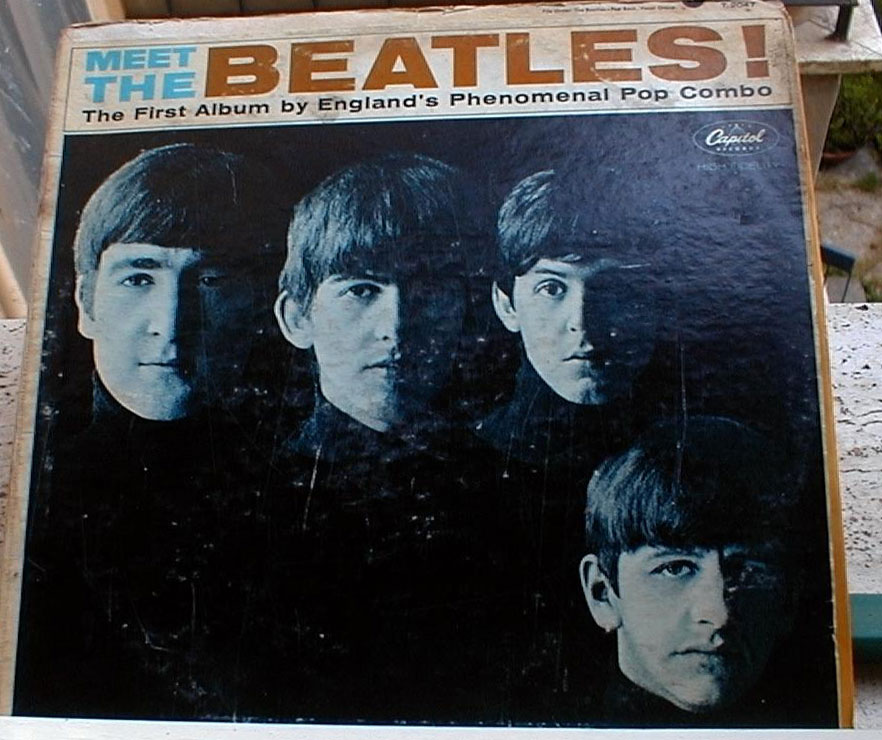to hell with the Beatles
Historian says Beatles were just capitalists, and not youth heroes
Fab four ‘created passive teenage consumers’
Academic prefers mods and folk revivalist

The Beatles in 1963 Photograph: PA
John Lennon controversially declared they were bigger than Jesus, and the levels of fan hysteria and devotion they engendered made them synonymous with the youth culture of the swinging 60s. But a Cambridge University historian today argues that the Beatles were not heroes of the counter-culture but capitalists who cynically exploited youth culture for commercial gain. David Fowler claims: “They did about as much to represent the interests of the nation’s young people as the Spice Girls did in the 1990s.”
Fowler claims that many commentators during the 1960s saw youth culture as being all about the Beatles. But he says that just because they were fantastically popular – maybe bigger than Jesus, as John Lennon said in 1966 – it did not make them leaders of their generation.
Instead Fowler identifies a dreamy, folk-dancing rural revivalist Rolf Gardiner, the father of conductor Sir John Eliot Gardiner, as a true youth culture pioneer of 20th century Britain.
Fowler, himself a student in Manchester during its heady 1980s Hacienda days, makes his claims in a study published today called Youth Culture in Modern Britain.
He believes that much that has been written about the Beatles, that they were at the forefront of a cultural movement of the young, for example, is untrue. “They were young capitalists who, far from developing a youth culture, were exploiting youth culture by promoting fan worship, mindless screaming and nothing more than a passive teenage consumer.”
Fowler points out the Beatles were appearing on TV shows such as the Morecambe and Wise show in 1963: “In effect, they were family entertainment, rather than at the cutting edge of youth culture.”
As well as debunking what he sees as myths about the Beatles, Fowler also examines the mods, a movement which began in north London suburbs such as Stamford Hill and Stoke Newington and over three years (1964-67) extended across Britain, although northern mods apparently wore their hair longer so as not to look like the southern mods appearing on Ready Steady Go! every week.
Fowler argues that “the mods were a more important cultural phenomenon than the Beatles because they generated the first geographically mobile, national youth movement that empowered thousands of youths and young females”.
Bands such as the Beatles and the Rolling Stones, Fowler argues, were just not interested in acting as mouthpieces for young people.
Indeed, Mick Jagger said as much in a TV interview with William Rees-Mogg. They were interested in selling records.
“The Beatles did not generate a youth culture at all; merely a youth audience of passive teenage (mainly female) fans who became superfluous when the group stopped touring Britain in 1965.”
A large chunk of the book is devoted to Gardiner, who Fowler maintains was a true youth culture hero.
While at Cambridge in the 1920s Gardiner formulated ideas for a “cult of youth” where young people could express themselves more freely and challenge the opinions of their elders.
He was fascinated by the Jugendkultur growing in Weimar Germany – with its rigorous youth hostelling, hiking and naked javelin throwing – and tried to build bridges with German youths by taking his troupe of young English folk dancers there for a tour of cathedral cities.
At Cambridge Gardiner was not averse to skinny dipping in the river Cam and was up at 6.30am to do his exercises in the nude.
The DH Lawrence-loving intellectual was trying to mix high culture with peasant culture and also took his dancers completely out of their normal comfort zones into English mining communities.
“He took these very genteel students to places like North Skelton in North Yorkshire and Durham and the local civic figures were transfixed by him. He was trying to develop a youth culture and youth communities across the social classes,” said Fowler.
Gardiner made many friends and miners were among the guests at his posh society wedding.
However, his reputation has been somewhat tarnished over the years by claims that he was a Nazi sympathiser.
Fowler disagrees: “He has been written off as a Nazi sympathiser but that is very, very misleading.
“He was trying to build up friendships. He was an idealist.”
Nor was he a sandal-wearing crank, argues Fowler, another barb which has been thrown Gardiner’s way. “People like Rolf Gardiner were true cultural subversives – pop stars before pop stars even existed.”
——-

Hold me tight
Tags: music, rock, the beatles